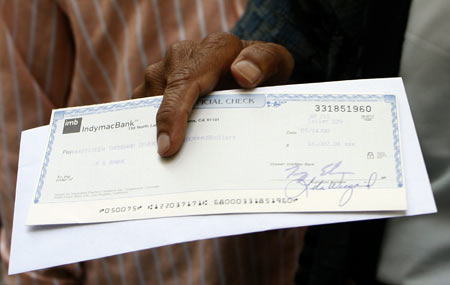
Banking transactions have undergone a massive transformation in last couple of years. Gone are the days when people had to stand in queues in front of the teller for hours for even minor transactions. Gone are the days when customer care in banks meant one lonely counter, manned by a harassed employee flooded with issues that took days, weeks or even months to be resolved. Most of the transactions are now just a selves abreast of the developments and their corresponding rights.
In our endless quest of seeking out the quirkiest, strangest issues of the consumer world, we landed on the following crucial things that consumers must keep in mind while dealing with their banks. Most of these points are fairly straightforward but ignorance of these simple things can at several instances rile up consumers in disproportionately complicated troubles.


Always insist on personalised cheque books
Or you may find yourself in such unsavoury situations that are beyond explanation in normal circumstances. A couple of days ago, an Akosha regular narrated to us an incident that suddenly made us realise the extreme importance of personalised cheque books. This particular individual had realised that the cheques he had sent out were being regularly cashed without a single penny being deducted from his account.
A closer enquiry revealed that the amount was being deducted from some other unsuspecting consumer's account in whose name the cheque book was originally issued but was handed over to this individual by mistake.
A capital mistake which can be easily avoided if the cheque book carries the name of the account holder. While most of the banks these days do issue personalised cheque books, there still may be instances where your cheque book is not personalised. Be very careful and vigilant. Return such a cheque book immediately and insist on a personalised one.

Deduction of fine for non-maintenance of minimum balance from an account holder's account is not allowed without due information of this term to the account holder
How many times have you bothered to check what is the minimum balance requirement on your account? Or more importantly, how many times have your bank actually and specifically told you about this term? Next time pay attention. Because if your bank has not specifically told you about this term, they cannot automatically deduct the amount from your account.
Banks cannot debit fines for non-maintenance of minimum balance from an account holder's account without informing the account holder about this term. As a logical extension of this condition, no amount can be debited from an account holder's account at the bank's discretion without hearing the account holder.
It is the responsibility and obligation of the bank to ensure that proper hearing opportunity is given to the account holder.

Don't just read the fine print, be vigilante about it
This is probably the most common advice that is given and yet the most ignored one. In the context of banking transactions, this advice becomes extremely relevant when consumers involve themselves in transactions like taking home loans.
In all such cases, just reading the fine print is not enough. What is important is being extremely vigilant about the terms and be very careful lest the terms are violated.
One of the most common complaints that we receive against the banks includes revision of interest rate without prior intimation, even though all standard contracts in this regard usually provide for a mandatory intimation to the consumer whenever there is a revision of the interest rate. If such an instance arises, notify the nodal officer of the concerned bank immediately and if the issue is not resolved, take up the matter before the Banking Ombudsman.

Have a grievance, get them redressed the right way
Redressal of complaints concerning banking transactions is a fairly confusing area for most consumers. In the event any such grievance arises, the consumers should immediately take it up with the concerned branch manager. Alternatively, or if the issue is not redressed at the branch level, the matter should be taken up with the nodal officers of the concerned bank who are exclusively designated to address consumer complaints.
The Banking Ombudsman can be approached if the bank rejects the complaint or does not respond to it within two months of filing the complaint with the bank. The complaint can be taken up before the Ombudsman only if written representation was made to the bank and either the bank had rejected the complaint or no reply was received from the bank within 60 days of receipt of complaint or in case of unsatisfactory reply received from the bank.
The Banking Ombudsman should be approached within one year of the bank rejecting or not responding to the complaint. The award passed by the Ombudsman is binding on banks but not on the consumer. It is only the bank against which such an award can be enforced, not the consumer.
We have attempted to list out and address a couple of issues that are a common cause of grievance and/or confusion for the consumers when it comes to banking transactions. Banking sector is one of the fastest evolving sectors in the country trying to sync itself with the rapidly evolving technology.
While on one hand this has made banking transactions way more consumer-friendly, it also comes with its own set of issues and complications. In order to avoid hassles and ensure optimum benefit from these evolved systems, consumers need to keep themselves abreast of the changes.
Consumers should make it a habit to read the documents and their bank's Web sites carefully. Timely redressal of issues is the best way to avoid unnecessary hassles and this can be ensured if the consumers are careful about their rights and concerns.